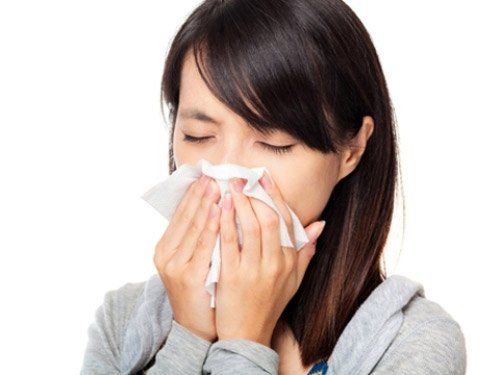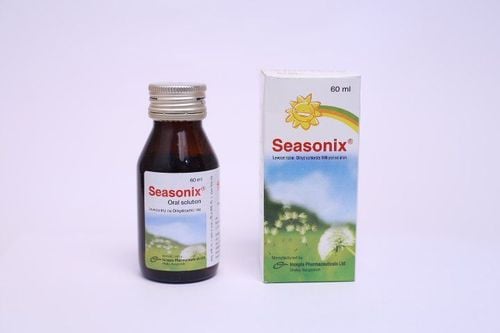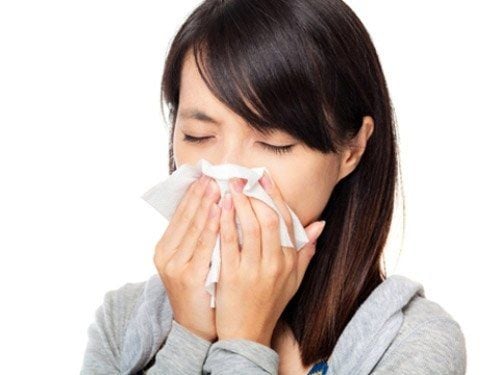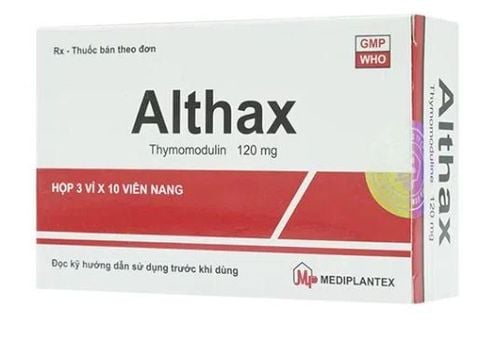This is an automatically translated article.
The article was professionally consulted with Specialist Doctor II Nguyen Van Thai - Ear, Nose Throat Doctor - Department of Medical Examination & Internal Medicine - Vinmec Danang International General Hospital.Allergic rhinitis is an inherited immunological disease, which is quite common nowadays in young people and tends to increase. Allergic rhinitis makes patients feel tired and uncomfortable, affecting the patient's quality of life.
1. Allergic Rhinitis
Allergic rhinitis is a disease that tends to appear more in the spring, the season when allergic diseases often develop. Allergic rhinitis can occur at any age, but is most common in adolescents or young adults.Allergic rhinitis is explained as a disease of the nose that is inflamed and swollen because of allergies to allergens inside and outside the body, can be dust, hair, fluff, changes weather, temperature, humidity, air pressure, can also be foods such as shrimp, crabs, eggs, milk, drugs, because the anatomical structure of the nose is abnormal, crooked or prickly in the nose. Nasal septum... Allergic rhinitis often occurs at the change of season, lasts long and makes the patient feel uncomfortable even though it is not life-threatening. Some studies suggest that, when harmful agents enter the body such as bacteria, viruses, etc., the body's immune system will fight these agents, but for rhinitis Allergic reactions cause the immune system to overreact to the irritating allergen, causing swelling of the lining of the nose, sinuses, and eyes. In addition, the disease is also genetic, meaning that if one parent has a history of allergic rhinitis, at birth, 30% of the children will have a chance of transmitting allergic rhinitis, and if If both parents have a history of the disease, the chance of having the disease in their children increases to 50%.

Viêm mũi dị ứng thường xảy ra lúc chuyển mùa
2. Symptoms of allergic rhinitis
The main symptoms of allergic rhinitis are itchy nose, stuffy nose, runny nose, thin, clear runny nose, more runny nose after sneezing, continuous and uncontrollable sneezing, itchy throat, itchy eyes. , itchy ears... These signs appear intermittently, increasing when there is a change in weather, it may be cold or when exposed to areas with a lot of dust. In cases of chronic allergic rhinitis, there may be symptoms of olfactory dysfunction, snoring, or tinnitus, headache, which are symptoms that are easily confused with allergic sinusitis.Allergic rhinitis includes 2 types: seasonal allergic rhinitis and year-round allergic rhinitis:
● Seasonal allergic rhinitis: Depending on different seasons of the year, there will be different types of allergens that appear to cause allergic rhinitis. cause allergic rhinitis.
● Allergic rhinitis all year round: The disease is related to allergens such as insects, house dust, pet dander... so it can appear at any time of the year.
Although the symptoms of allergic rhinitis are not life-threatening, if not treated promptly, they can also progress to cause nasal polyps, allergic sinusitis, sinus polyps...
In addition to the above symptoms, when clinical examination to diagnose allergic rhinitis is not confused with sinusitis, doctors will see that there is congestion when removing the nose, the floor of the nose contains Mucus, clear, pale nasal mucosa and nasal peduncle may also have edema, purple light.

Những triệu chứng chính của viêm mũi dị ứng đó là ngứa mũi, nghẹt mũi
3. Prevention of allergic rhinitis
Currently, allergic rhinitis is almost impossible to cure completely, but only in the direction of reducing symptoms to bring comfort to the patient. After treatment, these symptoms may return and cause discomfort.To prevent allergic rhinitis from happening, you need to do the following additional tips:
● Do not keep animals with too much hair in the house such as dogs and cats to limit allergies.
● Clean daily living items such as blankets, sheets, pillows, cushions, chair covers...
● Keep the place clean and cool, don't let the house get wet to prevent birth boiling and growth of bacteria.
● Clean your body every day, especially regular dental hygiene.
● Do not smoke, pipe tobacco...
● Do not come into contact with areas with a lot of dust, toxic chemicals.
● Wear a mask when going out or when cleaning, entering smoke-forced areas.
● When there is a change in the weather, it is necessary to keep the body temperature stable, especially the neck and nose area.
● Choose foods that do not cause allergies when digesting that food.
It is necessary to add some foods to limit the risk of allergic rhinitis as well as the possibility of recurrence of the disease to be reversed, namely vegetables and fruits containing a lot of vitamin C, foods with high nutritional value. Warm substances such as ginger, garlic ... as folk still often apply the treatment of allergic rhinitis with ginger, spices with essential oils, foods rich in omega-3 such as salmon, other fish.
● It is necessary to avoid foods that cause allergies such as fatty, fishy, milky foods, hot spicy foods, cold foods such as shrimp, crab... and some other foods. cause allergic reactions in the body.
Although it does not cause serious consequences, allergic rhinitis also makes patients uncomfortable because of symptoms such as stuffy nose, runny nose... so it needs to be detected and diagnosed promptly and accurately. , especially differential diagnosis with sinusitis, and appropriate treatment.
Vinmec International General Hospital examines and treats common nasopharyngitis diseases, head and neck tumors, congenital malformations of the ear, nose and throat area with the most optimal internal and surgical methods for patients, both children and adults. Coming to Vinmec International General Hospital, patients will receive a direct, dedicated and professional examination from a team of qualified and experienced medical staff.
BSCK II Nguyen Van Thai was formerly a Doctor of Otolaryngology and Head and Neck Surgery at the Department of Otolaryngology - Hue Central Hospital with more than 17 years of treatment experience, especially in the field of Head and Neck Surgery. Currently, he is an Otolaryngologist at the Inter-Specialist Clinic of the Department of Medical Examination and Internal Medicine, Vinmec Da Nang International General Hospital.
To register for examination and treatment at Vinmec International General Hospital, you can contact Vinmec Health System nationwide, or register online HERE.
Recommended video:
Sinusitis prevention and treatment methods
MORE:
Is allergic rhinitis contagious? What is the difference between Allergic Rhinitis and Common Rhinitis? How to effectively treat Allergic Rhinitis Diagnostic Tests














